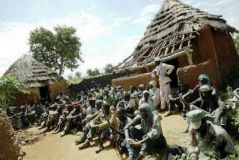Rebel infighting undermines Darfur peace talks
By Estelle Shirbon
ABUJA, June 28 (Reuters) – Divisions within two rebel groups from Sudan’s Darfur region over who speaks for the fighters on the ground are undermining peace talks in the Nigerian capital.

|
|
Sudanese Liberation Army rebels from different bases come together for a meeting in Tarenjer village, west Darfur, October 11, 2004. (Reuters). |
Mediators from the African Union (AU) say the parties are making slow progress towards agreeing a declaration of principles. But rebel infighting on the fringes of the talks is calling into question the value of any agreement.
The AU has resisted getting drawn into arguments over who speaks for the grassroots. “We simply cannot get involved in the internal affairs of the movements. What we want is to hear one voice per movement,” said an AU spokesman on Tuesday.
The talks at a luxury hotel in Abuja began on June 10.
The rebels took up arms in early 2003 over what they saw as discrimination and neglect by Khartoum, which rebels say reacted by backing Arab militias who drove non-Arabs from their homes.
Tens of thousands of people have been killed and more than two million driven from their homes into refugee camps in Sudan and Chad. Four previous rounds of peace talks have failed.
Trouble within the larger rebel group, the Sudan Liberation Army (SLA), stems from rivalry between President Abdel Wahed Mohamed al-Nur and Secretary-General Minni Arcua Minnawi.
Nur is leading the SLA team in Abuja but Minnawi, who left after the launch of the talks, commands greater allegiance from fighters in Darfur. Minnawi loyalists have said Nur no longer represents the movement and they will not recognise any deal he reaches with the government.
FIELD COMMANDERS
The SLA’s official spokesman at the talks said on Tuesday the dispute had been resolved. “There has been a reconciliation. If we reach a deal here, (Nur) will sign it and everyone will respect it,” said Abdelrahman Musa Abakar, who is also political adviser to Nur.
But a source close to the talks said the SLA delegation was still divided, with field commanders from Darfur being upstaged by more articulate negotiators who have been living abroad and are out of touch with their base.
“The field commanders are shy, they are fighters from remote areas who are not prepared for this kind of negotiation,” said the source, who spoke on condition of anonymity.
“They are sitting in their hotel rooms, depressed, talking about continuing the fight … The Minnawi faction, which is strongest in the field, is not being represented at the table.”
Divisions are also rife within the smaller Justice and Equality Movement (JEM), represented in Abuja by Khalil Ibrahim.
Ibrahim’s leadership was rejected in April by JEM field commanders, one of whom, Mohamed Salih Hamid, is in Abuja but has not been allowed to join the talks.
“The AU has taken the wrong man to the table. Ibrahim cannot make peace, he has no forces on the ground,” Hamid told Reuters. He said he would not consider himself bound by any deal struck in Abuja and criticised the AU for ignoring him.
The official JEM spokesman at the talks dismissed Hamid as a troublemaker sponsored by Ibrahim’s enemies outside of Darfur.
“He’s an agent of Chad. He’s here to stop the talks and he’s failed. We are making progress,” the spokesman said.
Complicating the picture is the JEM claim that it has fighters in eastern Sudan backing a separate rebellion against Khartoum that has flared up while the Darfur talks have been going on.
